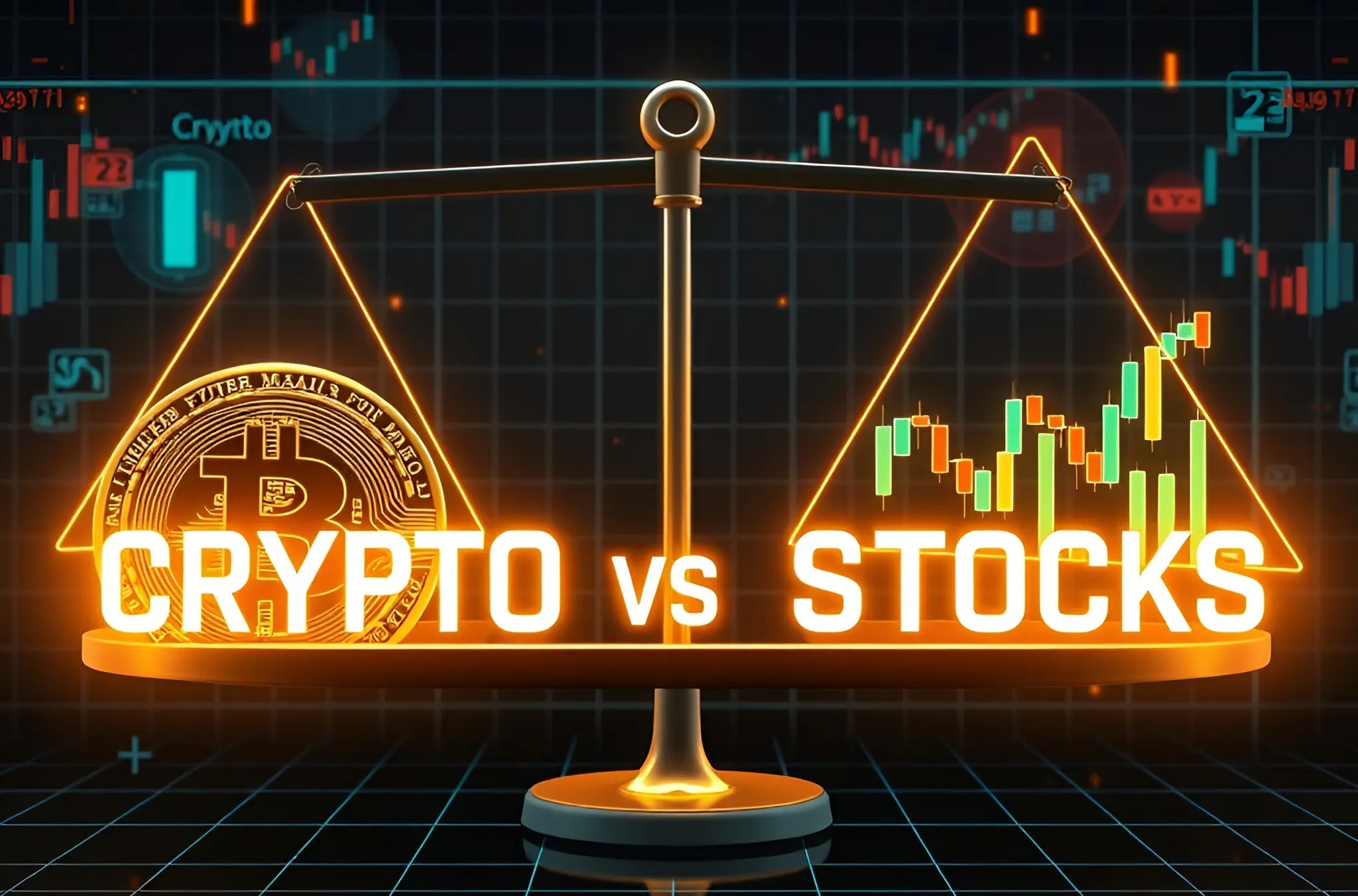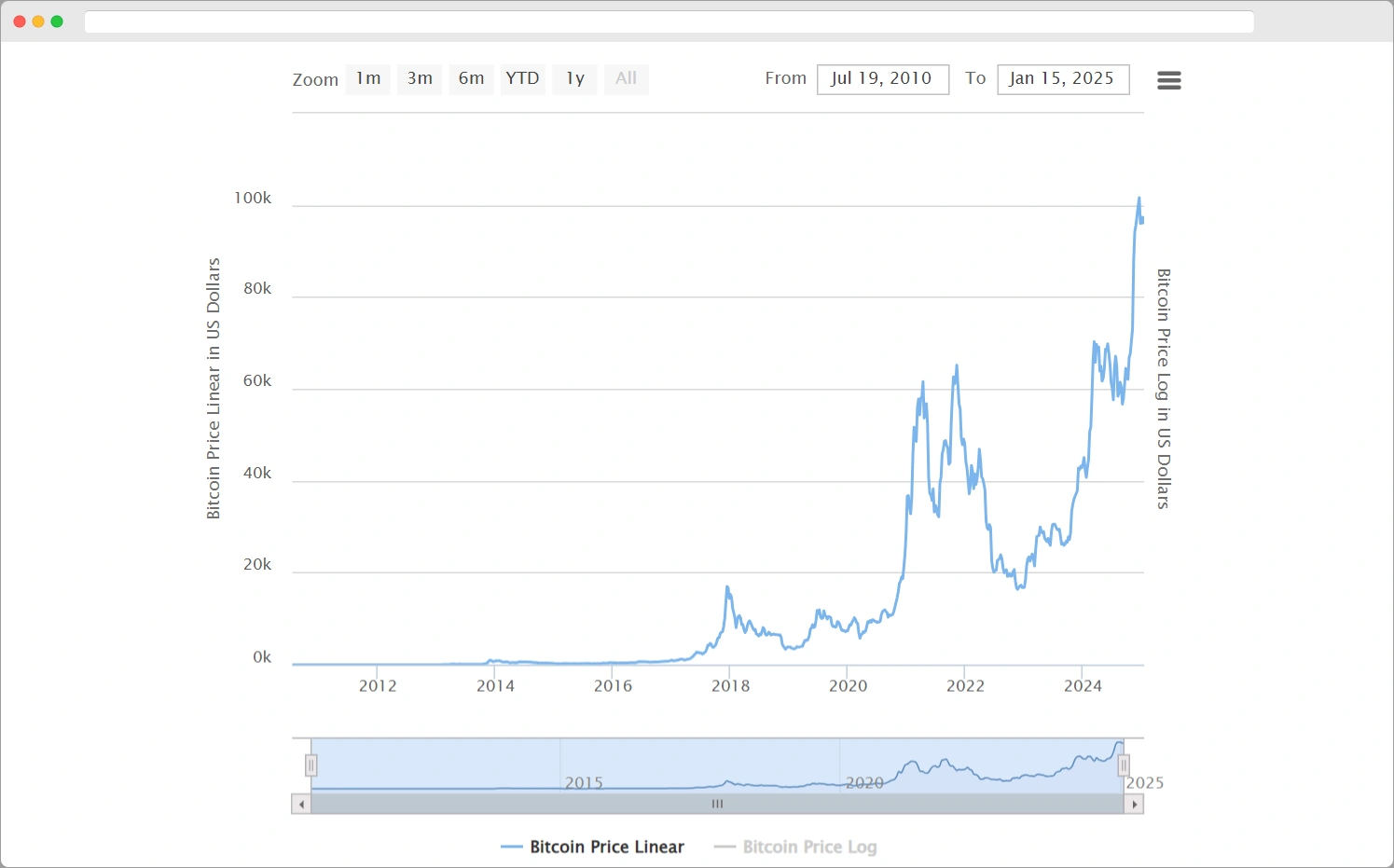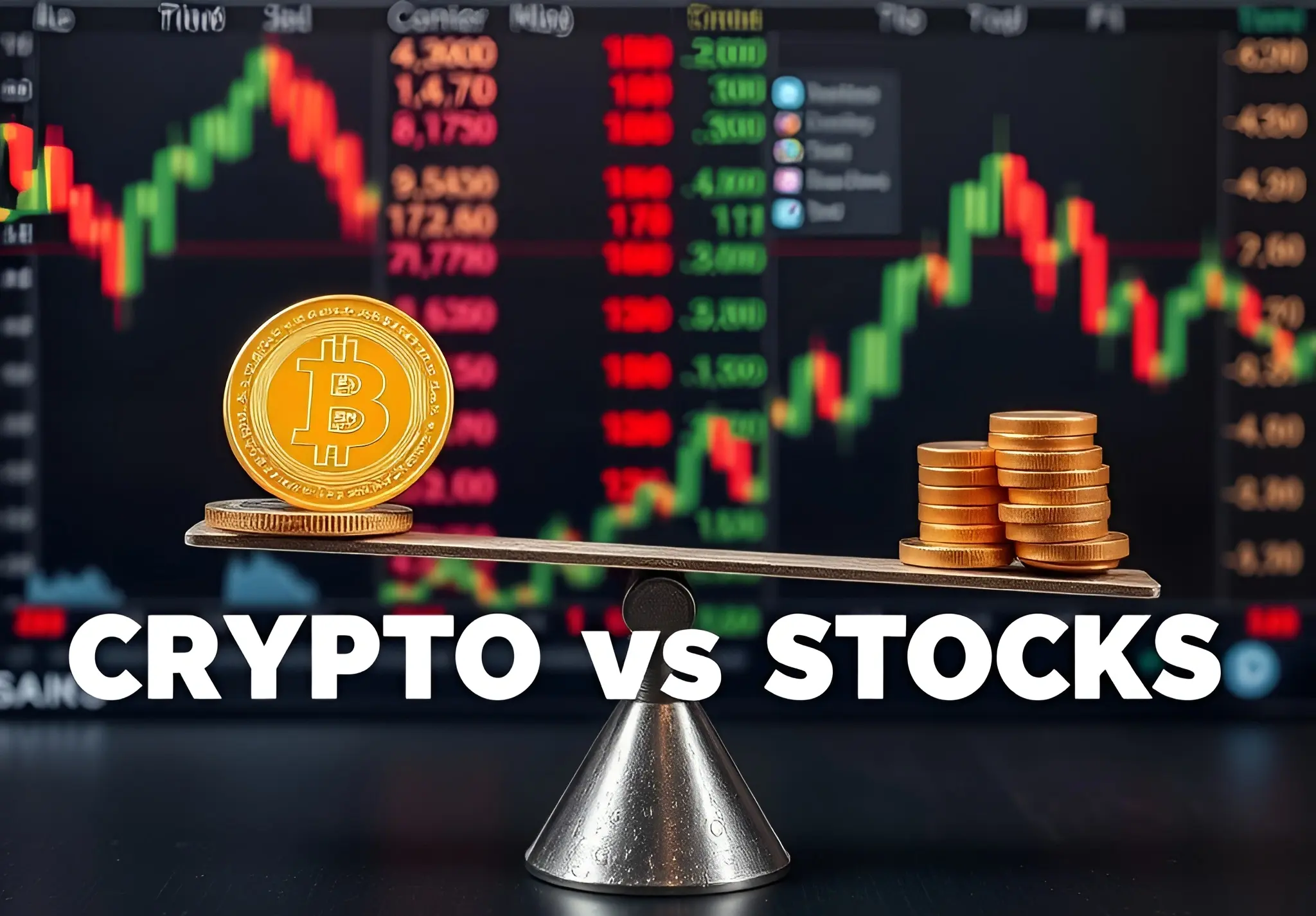Crypto vs Stocks: Which is Better?
The debate over crypto vs stocks has intensified in recent years, fueled by the dramatic rise of digital assets and the long-standing reliability of traditional equities.
While stocks represent fractional ownership in a company backed by assets and cash flow, most cryptocurrencies lack such foundational support.
Instead, they often rely on technological functions or underlying sentiment to drive their value.
Despite these fundamental differences, many investors find themselves pondering: cryptocurrency vs stock market—which is better?
In this comprehensive guide, we compare stocks and cryptocurrencies on key factors such as valuation, volatility, potential returns, and regulations.
By the end, you’ll be better equipped to decide whether stocks or crypto better align with your risk profile and investment objectives.
Key Takeaways:
Show
Should You Invest in Cryptocurrency or Stocks?

When venturing into any new investment, it’s crucial to understand the underlying asset thoroughly.
Whether you’re looking at cryptocurrency vs stocks market or traditional asset classes like bonds, diving in without adequate research can lead to poor decisions.
Here, we highlight important aspects of stocks and cryptocurrencies so you can make an informed choice.
1. Stocks
A stock grants you fractional ownership in a corporation, meaning you hold a legal claim on the company’s assets and future cash flows. This intrinsic value sets stocks apart from many other investment vehicles.
Why Stock Prices Fluctuate?
Stock prices move up or down as investors reassess a company’s prospects. In the long run, an increase in the company’s earnings, expansion, and overall profitability generally drives the stock price higher.
While market sentiments can inflate or depress the price in the short term, the firm’s underlying fundamentals—like consistent revenue growth—tend to determine long-term outcomes.
2. Cryptocurrency
Most cryptocurrencies, including Bitcoin and Ethereum, are not backed by physical assets or corporate earnings.
Instead, they function within blockchain networks that facilitate peer-to-peer transactions, smart contracts, or other decentralized applications.
Why Crypto Prices Fluctuate?
Cryptocurrency prices are heavily influenced by speculation, market sentiment, and the hope of future adoption.
Since they are not supported by assets or traditional cash flow, crypto values often hinge on the “greater fool theory”: you need someone willing to pay more than what you initially invested.
This reliance on sentiment and hype can lead to extreme volatility—prices can skyrocket and plummet in short time spans.
Pros and Cons of Investing in Cryptocurrency vs Stocks

When evaluating cryptocurrency vs stocks market, weigh the unique advantages and drawbacks each asset brings to your portfolio.
Understanding these dynamics helps you align your investments with your financial goals and risk tolerance.
1. Pros and Cons of Investing in Cryptocurrency
Possible Hedge Against Fiat Currency
Cryptocurrencies are often seen as a hedge against inflation. Because not controlled by central banks or governments, these digital tokens may maintain value when fiat currencies face devaluation.
Potential for Outsize Gains
The crypto market is known for explosive growth, with some coins experiencing immense price increases. However, big gains come with equally significant risks.
Growing Number of Coins
There are thousands of cryptocurrencies, each aiming to solve different problems or cater to specific market niches.
While this diversity offers opportunities, it also raises the risk of scams or projects with little long-term viability.
Widespread Interest in Digital Currencies
Increasing corporate and governmental acceptance could drive long-term demand. Tesla has previously held Bitcoin on its balance sheet, and El Salvador adopted Bitcoin as legal tender, signaling greater mainstream adoption.
Extreme Volatility
Crypto’s rapid price swings can lead to massive gains or devastating losses. Traders need a high tolerance for risk and the emotional steadiness to handle significant market fluctuations.
Cybersecurity Risks
High-profile hacking incidents underline the importance of secure wallets and robust exchange security measures. Once stolen, crypto funds can be difficult, if not impossible, to recover.
No Intrinsic Value
Most cryptocurrencies lack inherent worth because they aren’t tied to revenue-generating entities. Their value largely depends on market perception and speculative buying.
Regulatory Risks
Regulatory stances on crypto vary dramatically by country. While El Salvador has embraced Bitcoin, China has outright banned most crypto activities, and the U.S. continues to evolve its regulatory framework.
2. Pros and Cons of Investing in Stocks
Long History of Solid Returns
Over the long term, equities—particularly in markets like the S&P 500—have shown annualized returns of around 10%.
Although short-term fluctuations are inevitable, the historical trend for diversified stock portfolios is generally positive.
Intrinsic Value Backed by Earnings
A stock is a share of a company’s assets and profits. This linkage to tangible performance helps stabilize valuations and can provide dividends, offering an ongoing stream of income.
Accessibility
Online brokerages have made stock investing more straightforward and cost-effective, often featuring zero-commission trades.
You can also buy index funds for diversification and invest with minimal starting capital.
Stronger Regulation
Stock markets are tightly overseen by agencies such as the U.S. Securities and Exchange Commission (SEC).
Public companies must disclose financial data, providing a level of transparency absent in many cryptocurrency projects.
Volatility (But Generally Less Than Crypto)
Stock prices can swing, especially in individual companies, but they tend to be more stable compared to cryptocurrencies.
Over time, equities typically recover from downturns, making them well-suited for long-term strategies.
Lower Potential for Extreme Gains
While you can find high-growth opportunities in certain stocks, major indices like the S&P 500 rarely see the astronomical price surges occasionally witnessed in the crypto market.
Other Considerations When Investing in Stocks vs Crypto

When deciding whether to go with stocks or crypto, it’s important to tailor your choice to your personal time horizon, risk tolerance, and broader portfolio strategy.
Day trading crypto vs stocks also presents different challenges and potential rewards, so it’s vital to align your trading style with the nature of the asset.
1. Time Horizon
The period over which you plan to hold an investment heavily influences whether you should opt for crypto or stocks.
Stocks’s Time Frame:
Although equities can experience short-term volatility, they tend to be less erratic than crypto.
Many financial advisors recommend holding a diversified stock portfolio for at least three to five years to ride out market fluctuations.
Cryptocurrencies’ Time Frame:
Extreme price swings make crypto less suitable for near-term goals. Bitcoin, for instance, has lost more than half its value in mere months, only to recover and double from its lows. Investors with long time horizons are generally better equipped to weather this volatility.
2. Portfolio Management
Constructing a balanced portfolio doesn’t have to be an either-or decision. You can integrate both asset classes, depending on your risk appetite and financial objectives.
Cryptocurrency:
Given the high risk of a total or partial loss, many experts advise allocating no more than 5% (or a percentage you’re comfortable with) of your portfolio to crypto.
Rebalancing periodically is crucial—if crypto appreciates significantly, you might reduce exposure to maintain your desired risk profile.
Stocks:
Because of their established track record and regulatory safeguards, stocks often form the core of many investors’ portfolios.
You can choose to invest in growth stocks or stable dividend payers—or simply buy an index fund for broad market exposure.
3. Valuation Metrics in Traditional Stocks vs Cryptocurrencies
Valuation is central to making wise investment decisions, yet cryptocurrency vs stock market which is better can hinge on how each asset is valued.
| Factor | Stocks | Cryptocurrencies |
|---|---|---|
| Valuation Model | Based on earnings & assets | Based on network activity & speculation |
| Key Metrics | P/E Ratio, P/B Ratio, EPS | Hash Rate, Active Addresses, NVT, S2F |
| Intrinsic Value? | Yes (driven by company performance) | No (primarily market-driven) |
| Supply Mechanics | Can issue new shares | Fixed or protocol-dependent inflation |
| Market Drivers | Corporate earnings, macroeconomic factors | Market sentiment, adoption, regulation |
Stocks:
Investors evaluate corporations using tools like the Price-to-Earnings (P/E) Ratio, Price-to-Book (P/B) Ratio, and Earnings Per Share (EPS). These metrics provide insight into whether a stock is overvalued or undervalued.
Cryptocurrencies:
Because they don’t represent ownership of a revenue-generating entity, crypto’s value often hinges on on-chain metrics like hash rate, active wallet addresses, and token supply dynamics.
Sentiment and speculation heavily influence prices, making valuation more art than science in the crypto world.
Real-World Adoption of Crypto vs Stocks

Beyond risk and return, another crucial factor is real-world adoption. While stocks benefit from centuries of market infrastructure and investor confidence, cryptocurrencies have emerged as a technology-driven alternative offering decentralized solutions.
1. Real-World Use Cases of Cryptocurrencies
- Payments and Transactions: Bitcoin, stablecoins like USDT, and altcoins are increasingly used for quick, cost-effective cross-border payments, sidestepping traditional financial institutions.
- Remittances and Financial Inclusion: Countries with limited banking facilities are turning to crypto for fast, low-fee remittances. El Salvador’s adoption of Bitcoin as legal tender underscores its potential to enhance financial inclusivity.
- Smart Contracts and DeFi: Ethereum’s smart contract capability has spurred the rise of DeFi platforms like Aave, Compound, and Uniswap. These services operate without intermediaries, disrupting traditional banking models.
- NFTs and Digital Ownership: Non-Fungible Tokens (NFTs) enable verifiable ownership of digital assets across art, gaming, and entertainment. This revolutionizes how creators monetize their work.
- Supply Chain Management: Companies such as IBM and Walmart integrate blockchain to increase transparency and traceability in global supply chains.
2. Real-World Use Cases of Stocks
- Ownership and Shareholder Rights: Investors gain voting rights, legal protections, and a share in corporate profits. This tangible stake aligns shareholder interests with a company’s success.
- Dividends and Passive Income: Many companies pay dividends, offering a consistent income stream. This feature can complement capital gains for long-term wealth accumulation.
- Regulation and Transparency: Stocks are heavily regulated, compelling corporations to disclose financial information publicly. This system aims to protect investors and maintain market integrity.
- Participating in Economic Growth: Stocks often track broader economic progress. As a company expands and profits increase, stockholders benefit from a rising share price.
- Index Funds and ETFs: Retail investors gain instant diversification through index funds and exchange-traded funds (ETFs), mitigating risk compared to individual stock selection.
Derivatives and Futures Trading in Crypto vs Stocks

Both crypto and stock markets offer futures and derivatives for hedging or speculative purposes, but the associated risks, liquidity, and regulatory frameworks vary significantly.
1. Stock Market Derivatives & Futures
- Examples: Options, swaps, and futures contracts tied to indexes like the S&P 500
- Function: Provide a hedge against market downturns (e.g., institutional investors using stock futures to safeguard large portfolios)
- Regulation: Overseen by bodies such as the SEC and CFTC, ensuring transparency and reducing fraudulent practices
2. Crypto Derivatives & Futures
- Platforms: Major exchanges like Binance and CME offer Bitcoin and Ethereum futures
- Leverage: Traders can borrow extensively (sometimes up to 100x), magnifying both gains and losses
- Regulatory Ambiguities: Crypto derivatives are less regulated, presenting a higher risk of sudden price movements and liquidation events
The Similarities Between Crypto and Stocks

Despite their differences, both markets share some common ground, making crypto vs stocks less of a black-and-white distinction than one might assume.
1. How They Are Transacted
Technological innovation is blurring the lines between traditional stocks and digital assets.
Some of the platforms facilitate the purchase of both equities and cryptocurrencies in a seamless user interface.
24/7 vs Market Hours: While stock trading typically follows set hours, many crypto exchanges operate around the clock, reflecting global demand and decentralized operation.
2. Scams
High potential returns in both equities and digital assets can attract scammers. Pump-and-dump schemes—previously common in penny stocks—are now prevalent in the crypto market.
Fraudsters artificially inflate an asset’s price through hype before selling, causing unsuspecting buyers to be left with steep losses.
3. More and More Common Investors
Institutional investors have begun exploring both equity and crypto markets, increasing capital inflow and scrutiny.
As professional money managers enter the crypto space, calls for greater transparency and regulation grow louder.
This trend could enhance liquidity, reduce volatility, and generally stabilize the market over time.
Which Is Safer, Stocks or Crypto?

When comparing cryptocurrency vs stock market which is better in terms of safety, several dimensions come into play:
- Risk-Adjusted Returns: Traditional indices like the S&P 500 often exhibit stronger risk-adjusted returns than flagship cryptos like Bitcoin, especially when using the Sharpe ratio as a benchmark.
- Regulation & Market Oversight: Robust legal frameworks governing stocks increase investor protections, while cryptos remain more vulnerable to manipulation due to less oversight.
- Market Manipulation Risks: Crypto whales can move prices significantly, exploiting gaps in market regulations. Stocks are also subject to manipulation, but stringent rules make it less common.
Overall, stocks generally offer a more stable, regulated environment, while cryptocurrencies carry higher risk—potentially accompanied by higher reward.
Bottom Line
Determining whether stocks or crypto suits your portfolio boils down to your individual risk appetite, investment horizon, and strategic goals.
- Risk-Averse Investors: A well-diversified stock portfolio—possibly through an index fund—provides a steady path toward growth and income. Intrinsic value and regulatory safeguards make stocks comparatively safer over the long term.
- Aggressive Investors: For those comfortable with elevated volatility and the possibility of swift losses, a small crypto allocation can offer outsized gains. Just limit your exposure to an amount you can afford to lose—often 5% or less of your portfolio.
- Alternative Exposure Options: If you’re intrigued by digital assets but hesitant about directly owning them, consider Bitcoin ETFs or blockchain-oriented companies in your equity portfolio. These provide crypto exposure with a fraction of the direct risks involved in coin trading.
In conclusion, day trading crypto vs stocks is a personal choice shaped by financial objectives and comfort with risk.
Many modern investors now blend both asset classes, aiming for a balanced portfolio that capitalizes on the stability of equities and the high-growth potential of digital assets.
The core principle—diversification—remains essential: you spread your bets, keep a long-term perspective, and adapt as markets evolve.
While the conversation around crypto vs stocks is far from settled, making an informed decision will keep you in the best position to navigate future financial landscapes effectively.
Frequently Asked Questions (FAQs)
Is crypto better than stocks?
It depends on your investment goals and risk tolerance.
- Crypto offers high potential returns but comes with extreme volatility and regulatory uncertainty.
- Stocks are generally more stable, backed by real businesses, and often provide dividends.
- Diversification: Some investors hold both to balance risk and reward.
For long-term wealth building, stocks are historically safer, while crypto offers high-risk, high-reward opportunities.
Is it still worth investing in crypto?
Yes, but with caution.
- Adoption is growing – Institutions and governments are exploring blockchain technology.
- Bitcoin and Ethereum continue to be major players with long-term potential.
- Risk remains high due to regulation, scams, and volatility.
If you invest, consider a diversified strategy and only risk what you can afford to lose.
Can I lose more than I invest in crypto?
- If you buy and hold spot crypto, you can only lose your initial investment.
- If you trade with leverage or futures, losses can exceed your deposit.
- Security risks: Hacks, scams, and forgotten passwords can lead to total loss.
Always understand the risks and use proper risk management strategies.
Why is crypto more volatile than stocks?
- Lack of regulation – Fewer protections mean bigger price swings.
- Speculation-driven – Many investors trade crypto for quick profits, increasing volatility.
- 24/7 trading – Unlike stocks, crypto markets never close, leading to constant price fluctuations.
Is crypto good for long-term investment?
- Bitcoin and Ethereum have shown long-term growth, but crypto is still highly speculative.
- Adoption is increasing, but the market remains unpredictable.
- A long-term strategy should include diversification and a strong risk management plan.
Does crypto have a future?
Yes, but its role may evolve:
- Blockchain technology is being adopted across industries.
- Regulation will shape its future—whether positive or restrictive.
- Institutional interest is growing, signaling long-term potential.
While some cryptos may fail, the technology and key assets like Bitcoin and Ethereum are likely to persist.







